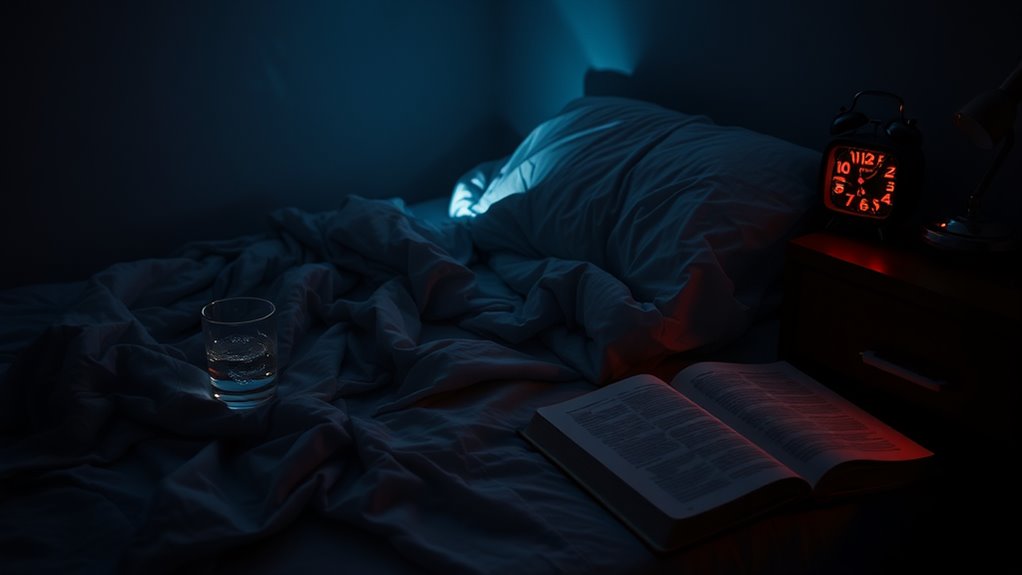Are You Making These Sleep-Killing Mistakes Every Night.
Like a jigsaw puzzle, your sleep routine often feels incomplete. You might not realize it, but small habits can have a big impact on your nightly rest. Are you skipping set bedtimes, ignoring your sleep environment, or indulging in late-night snacks? These common pitfalls can leave you tossing and turning. Discover how to identify and correct these mistakes for a more restful night and improved well-being.
Key Takeaways
- An inconsistent sleep schedule disrupts your internal clock, leading to grogginess and reduced focus during the day.
- A neglected sleep environment, filled with clutter and noise, can significantly hinder your ability to rest well.
- Overindulgence in caffeine and alcohol can delay sleep onset and disrupt sleep cycles, resulting in poor sleep quality.
- Excessive screen time before bed stimulates your brain and inhibits melatonin production, making it harder to relax and fall asleep.
- Ignoring stress management and eating heavy meals late at night can lead to tossing and turning due to anxiety and digestion issues.
Skipping a Consistent Sleep Schedule
Have you ever wondered how skipping a consistent sleep schedule affects your overall well-being? It’s one of those sleep mistake habits that can sneak up on you.
When you go to bed and wake up at different times, your body struggles to regulate its internal clock. This leads to poorer sleep quality, making you feel groggy and unfocused during the day. Your mood can plummet too, increasing stress and irritability.
To break this cycle, try to set a regular sleep schedule, even on weekends. Consistency is key to restoring your body’s natural rhythms and improving your overall health. Additionally, maintaining a consistent sleep schedule can significantly enhance sleep quality and overall well-being.
Neglecting the Sleep Environment
How often do you think about your sleep environment when trying to get a good night’s rest?
Your bedroom should be a sanctuary, but if it’s cluttered, noisy, or too bright, you’re setting yourself up for sleepless nights.
Invest in blackout curtains to block unwanted light and consider a white noise machine to drown out distractions.
The mattress and pillows matter too—ensure they’re comfortable and supportive.
Keep the room cool, ideally between 60-67°F.
Small changes can make a big difference. Improving your sleep environment can lead to enhanced sleep quality and overall well-being.
Prioritize your sleep environment to create a space that invites relaxation, helping you drift off into a peaceful slumber.
Overindulging in Caffeine and Alcohol
What happens when you indulge in caffeine and alcohol too close to bedtime? You might find it hard to fall asleep or stay asleep. Caffeine can keep you alert, while alcohol disrupts your sleep cycle. Both can lead to a restless night, leaving you tired the next day. Here’s a quick comparison:
| Substance | Effects on Sleep | Recommended Cut-off Time |
|---|---|---|
| Caffeine | Increases alertness, delays sleep | 6 hours before bed |
| Alcohol | Initial drowsiness, later disruptions | 3 hours before bed |
| Sleep Quality | Poor due to disturbances | Aim for uninterrupted sleep |
Making mindful choices can help you sleep better. Additionally, incorporating a simple 5-minute bedtime habit may significantly enhance your sleep quality.
Excessive Screen Time Before Bed
After considering how caffeine and alcohol can impact your sleep, another common culprit often goes unnoticed: excessive screen time before bed.
Scrolling through social media or binge-watching shows stimulates your brain, making it harder to unwind. The blue light emitted by screens interferes with melatonin production, the hormone responsible for regulating sleep.
To improve your restful hours, aim to unplug at least an hour before bedtime. Instead, try reading a book or practicing relaxation techniques. By creating a screen-free bedtime routine, you’ll signal to your body that it’s time to wind down, leading to better sleep quality and overall well-being. Additionally, incorporating a breathing technique can further enhance your ability to relax and prepare for sleep.
Ignoring Stress and Anxiety Management
Have you ever noticed how stress and anxiety can keep you tossing and turning at night? Ignoring these feelings won’t help; instead, they’ll magnify your sleep troubles. Managing stress isn’t just a luxury; it’s essential for restful sleep. Here are some effective strategies you can try:
- Practice mindfulness or meditation to calm your mind before bed. Incorporating just 10 minutes of daily meditation can significantly reduce stress and improve your emotional health.
- Establish a wind-down routine that signals your brain it’s time to relax.
- Write down your worries in a journal to release them from your mind.
Eating Heavy Meals Late at Night
Eating heavy meals late at night can seriously disrupt your sleep quality.
When your body’s busy digesting a large meal, it makes it harder to relax and drift off.
Plus, those unhealthy late-night cravings can lead to a cycle of poor choices that affect your rest.
Digestion Disrupts Sleep Quality
Why do so many people struggle with sleep after indulging in heavy meals late at night?
When you eat large portions, your body works overtime to digest, which can disrupt your sleep cycle.
Here are a few reasons why this happens:
- Increased heartburn: Lying down after a big meal can lead to discomfort and acid reflux.
- Restlessness: A full stomach can make it difficult to find a comfortable sleeping position.
- Interrupted sleep: Your body may wake you up to process food, preventing deep sleep.
To improve your sleep, consider lighter meals in the evening.
Your body will thank you!
Unhealthy Late-Night Cravings
After a long day, it’s all too easy to find yourself reaching for snacks in the late hours, often gravitating toward unhealthy options.
Those heavy meals can disrupt your sleep cycle and lead to restless nights.
While it might feel comforting, indulging in high-fat or sugary foods can cause indigestion and keep your body awake when it should be winding down.
Instead, opt for lighter snacks like yogurt or fruit.
Establishing a cutoff time for eating can also help.

